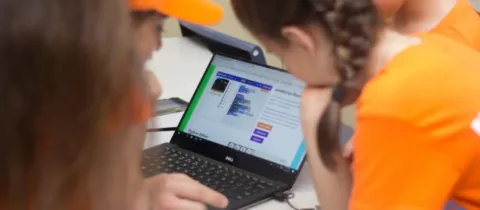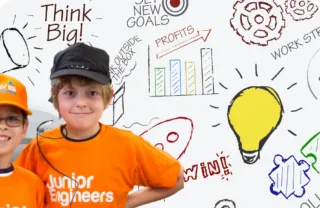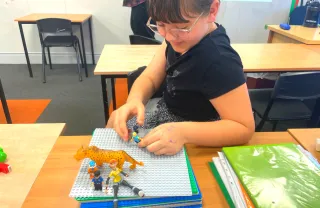
We all know the future of our world is digital – so what can be more important to a child’s future than providing them with the fundamental skills that will set them up for future success in a world where technology touches every aspect of our lives. And when it comes to preparing kids for this future, there are few skills better to learn than computer coding!
Coding is the computer language used to develop apps, websites and software. Without it, we would have none of the major technology we’ve come to rely on such as Facebook, our smartphones, iPads, traffic lights and the list goes on. It all runs on code and the Australian government, schools and parents are now recognising the importance of teaching kids the language of the future.
Malcolm Turnbull has declared coding to be as “fundamental as reading and writing” in an “agile, innovative and creative” Australia.
So why is this subject currently receiving so much attention and why is it so critical for kids to learn how to code?
Firstly, it’s hard to imagine a life without the use of software and technology. When we wake up in the morning, we use our digital alarm clock, we get to work utilising vehicles that rely on code and make trips based on digital navigation systems, we make phone calls that are software-controlled, we are constantly connected to a network via our phone or computer, we shop online, download films onto our tablets, we use programmed machines to produce our food, clothes and other everyday items. All of this technology has been programmed by developers and if we want to properly prepare our kids for our digital future, we must ensure that they obtain the fundamental skills in coding that allows children to become producers, and not merely consumers of technology, which in turn, future-proofs the nation’s economy and its workforce.
A 2017 report released by KPMG suggests that as many as half of Australia’s jobs could be lost to automation within the next two decades, and more than 5 million roles will simply cease to exist. Deloitte Access Economics research prepared for the Australian Computer Society found Australia will need 100,000 more workers with information and communications technology (ICT) skills within five years. Furthermore, an Oxford University study has noted that in the next 25 years, 47% of jobs will be subject to technological displacement however, those that have the skills in programming technology will always be in demand.
The reality is that the kids of today will end up working in jobs that do not yet exist and coding skills are essential if they are to keep pace in a fast-changing employment market that will require mental agility, flexibility and imagination.
And it’s not simply about the end game and employment outcomes – there are many other benefits of teaching children to code from an early age. Listed below are 4 other incredibly beneficial outcomes for kids who learn to code:
Problem Solving and Critical Thinking Skills
Learning coding techniques helps children to develop critical thinking skills and problem solving processes that are not only important in computer science, but also in life. It teaches them how to look at the bigger picture, and to break down big challenges into smaller and more manageable tasks. Other than it being professionally applicable, it also helps one to achieve big and overwhelming goals. Coding teaches kids to think of the smaller steps you need to take in order to get you closer to your goals, which gives you more drive and focus.
Coding Improves Academic Performance and Soft Skills
Coding complements maths: coding is a real-world way to teach mathematical thinking. When students create or debug a program, they practice solving problems and applying mathematical concepts such as variables and conditions, which helps develop their mathematical acumen.
Creativity: a programmer faces a problem – a condition or process in the world that is imperfect. It’s now the programmer’s job to envision possible solutions to that problem and coders need to find these solutions through experimentation and creativity.
Confidence: parents enthusiastically report that they’ve noticed their kids’ confidence building as they learn to problem-solve through coding
Resilience: coding incorporates debugging, testing and repetition. There’s no better way to build perseverance and resilience than working through problems and finding solutions.
Digital literacy: coding is a basic literacy in the digital age, and it’s important for kids to understand, and be able to not only consume but create with, the technology around them.
Improved Memory and Attention Span
It isn’t just logical reasoning that is improved when learning to how to code, learning to code will improve your child’s memory and increase their attention span. When learning to code, there are fundamental rules that are learnt (memorised), which takes a lot of repetition and time to learn (attention span). These skills are like any other muscle, when they are worked they grow stronger.
Coding Builds Multitasking Skills
If your child learns to code, they will become skilled at switching between two systems of writing and structure. This ability to easily switch between different structures makes them good multitaskers, according to a Pennsylvania State University study.
It is clear that every aspect of our lives in the future is going to be reliant on technology. While the older generations are adjusting to new technologies, today’s generation will grow up with them. In a future dominated by digital technologies, does it not make sense to teach our kids how to communicate with, control and create these technologies?
Recommended Articles
Unlock Savings and Skills: Exploring Junior Engineers' Buy More, Save More Offer
School Holiday Programs: Stop Motion Animation for Kids
Gaming or learning? Minecraft Education Coding Classes explained
In a world dominated by technology, introducing kids to coding is an essential part of their education. But it’s critical to keep kid engaged and interested in what they are learning as part of this education – dry lines of code learned in isolation is rarely retained.






